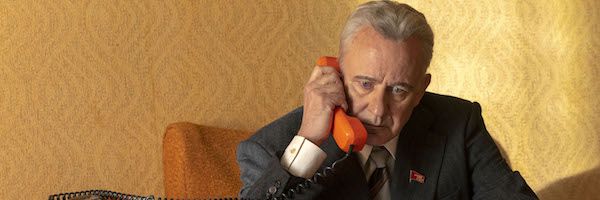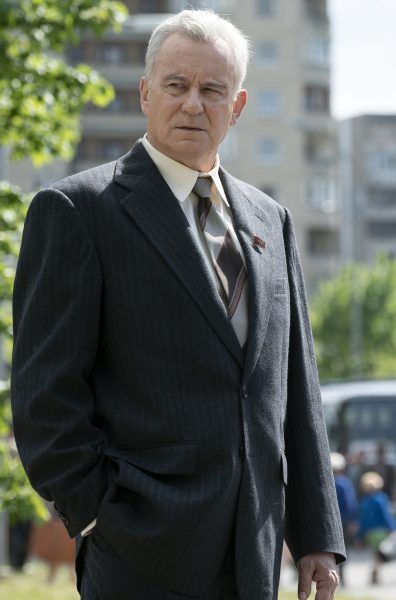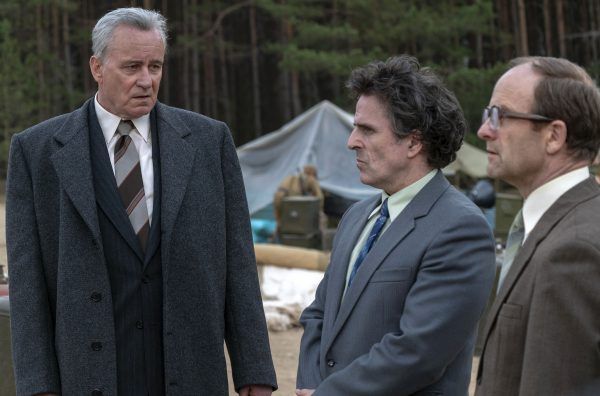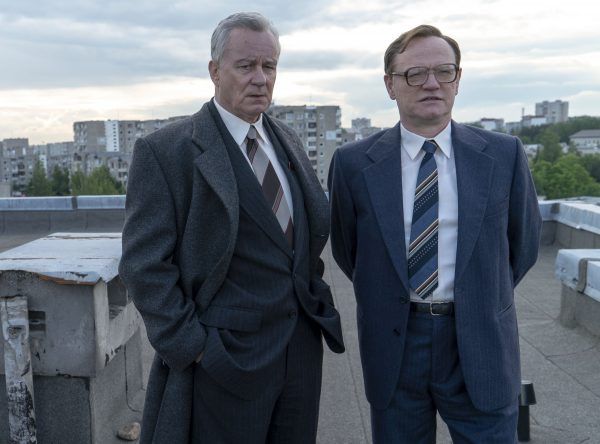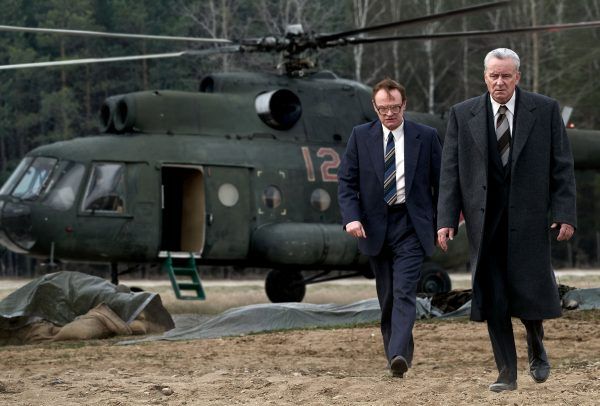From creator/writer Craig Mazin and director Johan Renck, the five-part HBO mini-series Chernobyl explores how the 1986 nuclear accident become one of the worst human-made catastrophes in history. After the Chernobyl Nuclear Power Plant in Ukraine, Soviet Union suffered a massive explosion that released radioactive material across Ukraine, Belarus and Russia, and as far as Scandinavia and western Europe, countless brave men and women sacrificed their own lives, both knowingly and unknowingly, in an attempt to save Europe from unimaginable disaster.
During this 1-on-1 phone interview with Collider, actor Stellan Skarsgard (who plays Soviet Deputy Prime Minister Boris Shcherbina, the man assigned by the Kremlin to lead the government commission on Chernobyl, in the hours immediately following the accident) talked about why this telling of the story appealed to him, playing a character who’s the representative of a faulty system, his perspective on the effects of Chernobyl vs. how we’re currently treating the world that we live in, the experience of shooting in Lithuania and being in a real nuclear power plant, working with co-star Jared Harris, and what he hopes people take from seeing this mini-series. He also talked about playing Baron Harkonnen in Dune, for director Denis Villeneuve, playing a very clear villain, and the hours of make-up involved, along with what he looks for in a project.
Collider: When this came your way and you got to read the script, what was it that made you want to sign on and have a hand in telling this story?
STELLAN SKARSGARD: First of all, it was a very well-written script, and it was not sentimentalizing the story. It was very true to the story, but also true to the people that were involved. It was not trying to put strength and sugar on everything. It’s very, very well written. But then, I also wanted to work with Emily Watson again, whom I haven’t worked with since we did Breaking the Waves, some 20 years ago. And I wanted to work with Jared Harris, who is a fantastic actor. I also knew the director, Johan Renck. We were supposed to do his first feature film together, many years ago, and it never happened, so I was looking forward to working with him, as well. There’s an enormous flow of content now, through all kinds of media channels. There are so many TV series made, and there’s so much film. Not many of the scripts I read are dealing with important subjects that concern us today, as much as this script does.
Did you get the scripts for all five parts of this, at once?
SKARSGARD: Yes, I read all five of them.
I love the way this story unfolds because I think it’s so effective, going back to the beginning, at the end of it. It’s told in a way that really emotionally affects you.
SKARSGARD: It does. And it’s the horrifying facts that are produced, combined with digressions into those stories about the humans that were involved, told in a beautiful, meandering way.
What was it about your character, specifically, that most interested you in playing him?
SKARSGARD: It’s interesting to play a character who is representative of a faulty system, and has spent his life defending it, and then has to look back at his life and admit that he’s been wrong. Finally, he comes to the conclusion that he has to stand up for something else.
What did you know about Chernobyl, prior to doing this, and how has your perspective changed now?
SKARSGARD: I was in Sweden when it happened, and I’m old enough to remember it. I remember the shock, when we had so much downfall in Sweden. For years, we could not eat berries, or mushrooms, or reindeer meat from Northern Sweden. We were affected, as a country. At the time, we had a referendum about whether we should have nuclear power in Sweden or not, and I voted against it, but we still have nuclear power because that side lost the referendum. Since then, the situation has become more complicated because today we are committing global suicide much faster, with carbon dioxides and all of the other shit that we’re pumping out, in terms of plastics, toxins, and everything. We’re killing this planet so fast that nuclear power is not the main villain anymore. It’s just one villain. How should you balance all of those stupid things we’re doing, to get to a point where we actually can make this planet survive? I don’t know. But I also think that, before we get a big nuclear catastrophe that will kill a lot of people, we’d probably have some idiot drop a nuclear bomb somewhere.
Yeah, which is all just a little bit terrifying.
SKARSGARD: Yeah, it is. And the treaties between the Soviet Union and the United States, and the world nuclear powers, has been broken now by the current president in this country. He has started expanding the production of nuclear arms.
What sort of research did you do for this? Were there things that helped you feel like you came to an understanding of who this man was?
SKARSGARD: I did because the real man is different from the man that I’m playing. The real man is very hard to get any information about. I play the character of the script, and the script and the story need some things from this character, whether that was the way he was or wasn’t. I don’t even look like the original character, Boris Shcherbina.
You shot the majority of this in Lithuania, with a little bit in the Ukraine. How was your experience there, during the shoot?
SKARSGARD: It’s very nice, and a very modern country. It’s just a really lovely place to shoot in. They have a good infrastructure, they have good crews, and the people are wonderful. Of course, there’s a very difficult history, having been a part of the Soviet Union. They also have a very spotted reputation for their actions towards the Jews, during the war, but that is common for a lot of countries in the region. I had a wonderful time being there, and even though the material is very serious, that doesn’t mean that you’re extremely serious, yourself, when you’re doing it. You have a lot of fun doing it. And working with actors like Emily and Jared was really rewarding, fun and beautiful.
Were you able to take any time to explore the area that you were in?
SKARSGARD: As much as I could. The first thing that you do is try to find some good restaurants. When you’re there, you’re working a lot, but you speak to people and make friends, and you learn about them and their culture pretty quickly, if you engage with them.
What was it like to shoot at a real nuclear power plant?
SKARSGARD: It was Ignalina, which was an enormous nuclear power plant with the same kind of reactor as they had at Chernobyl – the RBMK reactor. When Lithuania wanted to join the European Union, they were told that you’re not allowed to have reactors like that because they’re too dangerous, so they had to shut it down. That reactor provided most of the electricity in Ukraine, and they also exported electricity from there, so they were very proud of it, and it really was painful for them to shut it down. When we were there, it had been shut down for about 18 years or something, and they still had about 10 years left, in cleaning up the place. It’s a 20 to 30 year old process to clean up an old reactor. To be in there, I was not afraid of anything because there wasn’t really anything to be afraid of. Nothing that was going to explode or anything. It was just the size of it that was overwhelming, and the knowledge that when it was running, it was a thing that could go off, like a horrible bomb, and destroy all of Northern Europe, if it went bad.
We get to learn about your character through his interactions with Jared Harris’ character, Valery Legasov. What did you enjoy about exploring that relationship, and having Jared Harris to play that dynamic with?
SKARSGARD: It was lovely. I wouldn’t call them love story, but it was very close to a love story that starts very badly, and ends very well. But it’s two very different characters, so finding the common ground of the gradual growing of friendship between them was a wonderful arc to investigate. And working with Jared, who is such a brilliant actor, and I’ve always loved his work, was a pure joy. Watching him in the big courtroom scene at the end, where he basically talks for almost 40 minutes about very technical stuff, is a nightmare, in terms of learning text, and I really enjoyed sitting there, just seeing him, not only plow through it, but making it interesting and making sure that his character was alive, in every second of it. It was beautiful to see.
When we learn, at the end of the mini-series, that it could be anywhere between 4,000 and 93,000 deaths, as a result of Chernobyl, it’s clear that we’ll never know the actual human cost. Because of that, do you think it’s important for people to just learn about how and why this happened, and the role that truth and lies played in the outcome, since knowing the specifics is impossible to do?
SKARSGARD: Yeah. Whether it was 1,000 or 10,000 that died, and how many got cancer years later, we’ll never know, but the figures are not important. What is important is, what made it happen? What were the flaws in the system? What kind of corruption led to it? What kind of stupidity led to it? That corruption was inherent in the Soviet system. It was a system that was supposed to be portrayed as perfect and, at the same time, they did not have the resources or the money, and they had very hard economical demands, on every part of their society. And then, it comes to the cowardice of people. It’s the same in the West. It’s not the fear of the KGB or being imprisoned that makes you cut corners. It’s the fear of not producing enough profit that makes you cut corners. Even airplane makers cut corners to make bigger profits. Also, it’s important to be aware of the cynical decisions that are made for “a greater good” that ordinary human beings are always paying the price for.
You also signed on to play the villain in Dune. What made you want to be a part of that? Had you been a fan of the original film, or the novel?
SKARSGARD: No, I wasn’t. I actually just recently read the novel, which is a very good novel. But I’ve been a fan of Denis Villeneuve for quite awhile. It’s also a fun character to play. I don’t have to shoot that many days, but I have to spend six to eight hours a day in make-up. That makes it really hard, but interesting.
What’s it like to act through all of that?
SKARSGARD: If you work with good prosthetics people, the main thing that’s important is that your eyes are free to express themselves, and also that the material you’re working with makes it possible for you to physically express yourself, with your body.
What kind of villain is Baron Harkonnen, in this version of Dune?
SKARSGARD: He’s a pure villain. He doesn’t show any remorse, or any good sides. I usually don’t like dividing the world into the good guys and bad guys because I think it’s an illusion, since most of us have a little of both in us. But I would say that this is a bad, bad guy.
Is there a freedom in that, when you’re playing a character where there really is no doubt about who he is?
SKARSGARD: It’s a cartoonish way to look at somebody, but at the same time, he’s very human, in some ways. His actions are just absolutely horrendous.
What do you think will most surprise fans about this particular take on the material?
SKARSGARD: I don’t know. It’s a very long novel, and it’s really hard to compress into film because usually, it’s short stories that are better to make films out of. So, some might be disappointed that some of their favorite things are no longer in the story, but I also think they will be fascinated by Villeneuve’s way of visualizing that world that they have had in their mind for so long. And there are a lot of good actors that can be very pleasant to watch.
At this point in your life and career, what do you look for in a project? What gets you excited about a script and a character?
SKARSGARD: I love the process of making films. Sometimes I’ve done films where I didn’t care about the end result, as much as I cared about the process. I am enjoying myself when I work with good people on a set, and that is where I’m happy. And then, it’s somebody else’s problem to make a good film out of it, and make sure that it reaches the audience. But usually what I look for is complication, or ambiguity. I do prefer material that complicates our view of life, of humanity, of human beings, of politics, and everything.
Chernobyl airs on Monday nights on HBO.

